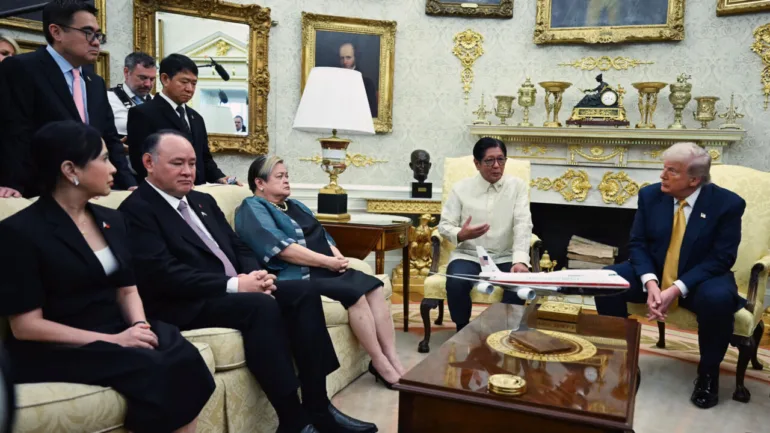US President Donald Trump on Tuesday agreed to reduce threatened tariffs on the Philippines by one percentage point following what he described as a “successful meeting” with Philippine President Ferdinand Marcos Jr.
Welcoming Marcos to the White House, Trump praised him as a “very tough negotiator” and said the two sides were “very close to finishing a trade deal, a big trade deal, actually.”
Shortly afterward, Trump announced on his social media platform Truth Social that while the Philippines would move toward opening its market to US goods, a 19% tariff would still apply to Philippine exports to the United States. This marked a slight reduction from the 20% tariff threatened earlier this month.
“It was a beautiful visit, and we concluded our Trade Deal, whereby the Philippines is going OPEN MARKET with the United States, and ZERO Tariffs,” Trump wrote. Despite the statement, the US will maintain tariffs on Filipino imports, particularly high-tech goods and apparel — two of the country’s major export sectors.
The Philippines was among two dozen economies that received letters from the Trump administration earlier this month warning of sweeping 20% tariffs on all imports into the US starting August 1. The 19% rate, while a symbolic gesture, still exceeds the 17% figure floated by Trump in April.
Trade friction amid strategic cooperation
The trade dispute comes even as defense ties between the US and the Philippines deepen in response to growing tensions with China in the South China Sea. The Philippines, a former US colony and long-standing treaty ally, has hosted increasing numbers of joint military exercises and weapons deployments.
Under President Joe Biden, the US last year deployed ground-launched missiles in the Philippines. The Pentagon has also explored establishing ammunition production facilities in the country, even after the closure of the US naval base at Subic Bay in 1992.
“All of what we consider part of the modernization of the Philippine military is really a response to the circumstances that surround the situation in the South China Sea,” President Marcos said during a joint appearance with Trump.
Trump, meanwhile, used much of his public remarks to attack former Presidents Biden and Obama but reaffirmed the US commitment to defending the Philippines.
“We are essentially concerned with the defense of our territory and the exercise of our sovereign rights,” Marcos said. “Our strongest, closest, most reliable ally has always been the United States.”
Trump eyes China visit
Tensions between China and the Philippines have risen in recent months due to maritime confrontations in the South China Sea, which Beijing claims almost entirely, despite a 2016 international tribunal ruling rejecting that claim.
Despite taking a tough stance on China’s economic practices, Trump has often spoken warmly of Chinese President Xi Jinping. During Tuesday’s remarks, he said he would “probably” visit China at Xi’s invitation “in the not-too-distant future.”
Commenting on the Philippines’ recent geopolitical alignment, Trump said: “I don’t mind if [Marcos] gets along with China very well, because we’re getting along with China very well. [The Philippines] had maybe been tilting toward China, and we untilted it very, very quickly.”
He credited himself with reversing Manila’s perceived pivot to Beijing, although the Philippines began realigning with Washington after Marcos’s 2022 election victory, prior to Trump’s return to office.
Marcos’s predecessor, Rodrigo Duterte, had pursued closer ties with China and clashed with the US, particularly over human rights concerns raised by the Obama and Biden administrations.
Duterte now faces charges of crimes against humanity at the International Criminal Court over his controversial anti-drug campaign, which human rights groups claim resulted in thousands of extrajudicial killings.
AFP


